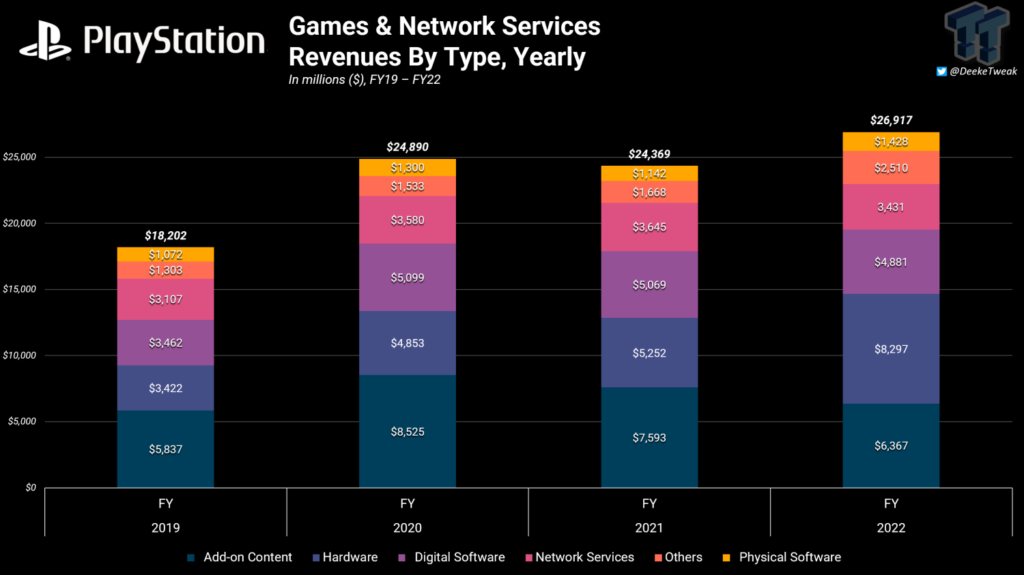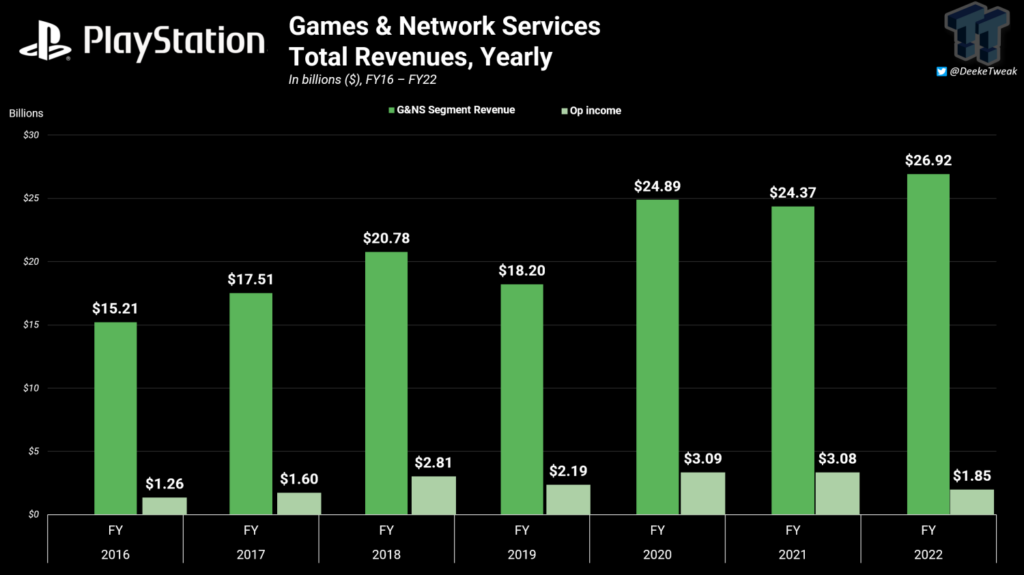Behind the Controller: How PlayStation Mastered Data Analytics

How PlayStation leveraged big data and analytics to create unparalleled gaming experiences while tackling privacy, regulation, and competition challenges.
The gaming industry has witnessed a remarkable transformation in recent years, driven in large part by the proliferation of smartphones and the explosion in the number of gamers worldwide. This digital revolution has not only expanded the gaming market but has also presented new challenges and opportunities. Within that story, it’s interesting to consider how PlayStation, one of the gaming industry giants, utilized big data and data analytics to create value in its business. While PlayStation’s adoption of these technologies has undoubtedly brought numerous benefits, it has not been without challenges.
PlayStation, a division of Sony Interactive Entertainment, has been a dominant player in the gaming industry since the release of its first console in 1994. To adapt to changing market dynamics and embraced technological advancements, PlayStation has levered data analytics to creative value in a variety of ways:
- Enhancing User Experiences: PlayStation serves a vast user base, with nearly 160M PS4 & PS5 consoles sold worldwide to date. Across that install base, PlayStation Network (PSN) records billions of hours of gameplay each month. To enhance user experiences, PlayStation has invests significantly in data analytics and infrastructure development. This investment allows them to continually refine their games and consoles, ensuring that games are engaging, relevant, and tailored to the preferences of their diverse player base.
- Efficient Marketing: PlayStation’s vast user base provides a treasure trove of data for marketing teams. In FY2020, PlayStation generated over $20B in gaming and network services revenue, a testament to the effectiveness of these data-driven marketing strategies. These strategies are guided by detailed player profiles and preferences, created through analysis of their proprietary data base.
- Operational Efficiency: The gaming giant’s operations span the globe, making efficient supply chain logistics and inventory management critical. By leveraging data analytics, PlayStation optimizes these processes, leading to cost savings and improved efficiency. For example, through data analysis, they can predict demand patterns, reducing the risk of overstocking or under-stocking consoles and games.


As the two charts illustrate, PlayStation has been able to grow top-line revenue (primarily through sales of “add-on content” and digital games – both of which are driven by data analytics deepening spend curves) and mostly enhance operating profit margins in parallel, reflecting improved operational efficiencies.
While PlayStation has harnessed the power of big data and data analytics effectively, it has not been immune to challenges:
- Data Privacy Concerns: Collecting and analyzing user data for personalized experiences raises privacy concerns. Players may be wary of sharing their data, fearing potential misuse or breaches. To address this, PlayStation invests heavily in robust data security measures and transparent data usage policies. In 2011, the PlayStation Network suffered a major data breach, which led to increased investments in data security.
- Regulatory Compliance: The gaming industry faces increasingly stringent data protection regulations. PlayStation must navigate these complex legal frameworks to ensure that its data practices comply with international and regional laws, such as the General Data Protection Regulation (GDPR). Non-compliance can result in significant fines, as seen with GDPR penalties.
- Data Quality and Accuracy: Data is only valuable if it is accurate and reliable. PlayStation has invested in data cleansing and quality control processes to ensure that the insights drawn from data analytics are trustworthy and actionable. They regularly audit and validate data sources to maintain data quality.
- Data Overload: Managing data from millions of gamers can be overwhelming. PlayStation continually invests in data storage and management solutions, including cloud-based infrastructure, to handle this massive influx of information. Their data centers are equipped to process and store vast quantities of data efficiently.
PlayStation’s journey in wielding the power of big data and data analytics to unlock business value is a tale of epic proportions, mirroring the grand transformation sweeping across the gaming kingdom. With millions of consoles sold worldwide and user bases that include more than 117 million PlayStation 4 users and over 41.7 million PlayStation 5 users, PlayStation’s commitment to data-driven innovation positions it as a hero in the quest to provide gamers with unrivaled experiences.
In this era of data-driven adventures, PlayStation has demonstrated that harnessing the power of big data and data analytics is essential for staying relevant and competitive in the gaming realm. As technology continues to advance and the gaming landscape evolves, PlayStation’s ability to confront these challenges and continue extracting value from data will be crucial to its long-term quest for success.
The gaming giant serves as a shining example of how big data can transform an industry, offering valuable lessons for other businesses venturing into the enchanted world of data-driven decision-making. In an ever-expanding gaming universe, PlayStation’s commitment to data-driven innovation positions it as a hero leading the charge to provide gamers with extraordinary experiences.
Citations:
- “Data Analytics Platforms in the Gaming Industry: What’s the Big Deal?” Selerity SAS. Accessed 17 October 2023. https://seleritysas.com/2021/04/23/data-analytics-platforms-in-the-gaming-industry-whats-the-big-deal/
- “PlayStation Delivers Record $26.9 Billion Revenue, Operating Profit Drops 40%.” TweakTown. Accessed 17 October 2023. https://www.tweaktown.com/news/91280/playstation-delivers-record-26-9-billion-revenue-operating-profit-drops-40/index.html
- Raz, Yosef. “3 Ways Big Data Is Transforming the Gaming Industry.” LinkedIn. Accessed 17 October 2023. https://www.linkedin.com/pulse/3-ways-big-data-transforming-gaming-industry-yosef-raz-onpassive-/
- “How Big Data Is Transforming the Gaming Industry.” Analytics Steps. Accessed 17 October 2023. https://www.analyticssteps.com/blogs/how-big-data-transforming-gaming-industry
- “How the Gaming Industry Uses Big Data to Shape Development.” Compare the Cloud. Accessed 17 October 2023. https://www.comparethecloud.net/articles/how-the-gaming-industry-uses-big-data-to-shape-development/
- Sony Interactive Entertainment. “Business Data & Sales.” Accessed 17 October 2023. https://sonyinteractive.com/en/our-company/business-data-sales/
- Drafted and edited using ChatGPT



Fascinating post Wabantu – thanks for sharing! I’ve always been fascinated with how gaming platform/console companies compete with each other to gain market share (Nintendo vs. Microsoft vs. Sony vs. Mobile, Desktop, etc.). Do you have a perspective on how Sony might collect and act upon their data assets, putting them in a unique position to win market share vs. their competitors? Perhaps the fact that they have massive scale and operate game studios might provide that unique data advantage.
Good stuff, Wabantu! I’m really curious to see how future data privacy laws shape the industry, especially as the number and types of appeal to which gaming appeals, grows. PlayStation relies heavily on data collection to incrementally improve its UX, and I wonder if the effectiveness of their iteration will be severely limited in the coming years.
I can see how the Playstation team uses data analytics to increase the operational efficiencies of their manufacturing processes, but one thing I’ve always been curious about is how they can better use the data from their gamers to create better games (or more curated games). Since most video game platforms now host their games digitally, and track players’ playing time or engagement (ex. Steam or the PS Store), I’ve always been keen to see if that data helps them discover player niches, which they then translate into games. Netflix has had great success in this area, by discovering undiscovered segments (i.e., people like to watch small-budget Korean horror movies), and then creating content to fill that void, in a way that large production studios typically cannot afford to, or unaware of. A rise in indie game that fills these targeted audiences would be great for the market, and may lower the barriers to entry for many smaller game studios.